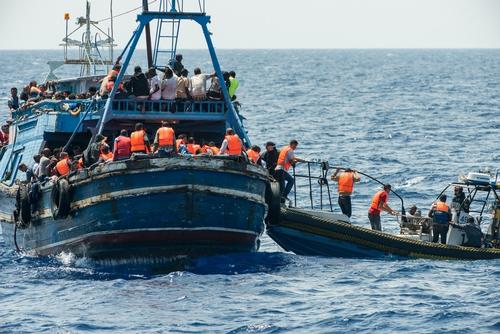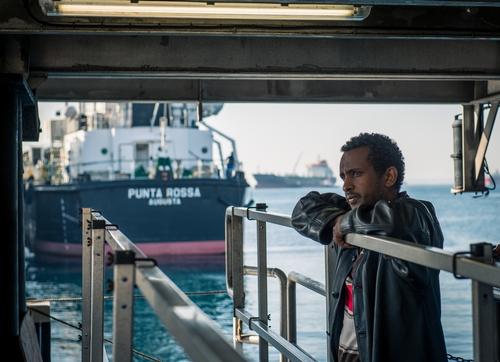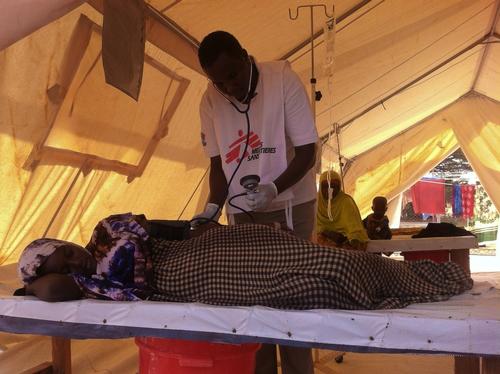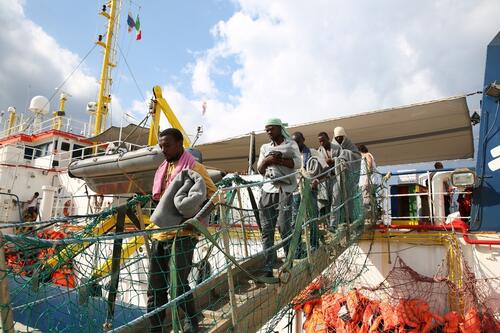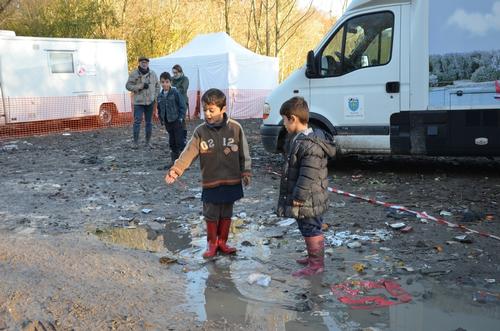Since the start of 2015, more than 100,000 asylum seekers have crossed the Mediterranean from countries like Eritrea, Syria, Somalia and Yemen, united in their desire to escape from conflict, instability, persecution and limited access to humanitarian assistance.
There are many legal and illegal routes to Europe, but Libya is now the most popular transit point because it is politically unstable and has a long and open coastline. In a bid to seek asylum and a safer life, people are paying smugglers to ferry them across the Mediterranean in unsafe and overcrowded fishing boats. In the first five months of 2015, more than 1,800 people have died, over five times as many as during the equivalent period last year.
Since May, MSF teams have begun responding to the crisis aboard three rescue vessels: the Phoenix (launched in May in partnership with MOAS), the Bourbon Argos (also launched in May) and Dignity 1 (launched in June).
MSF teams have assisted with more than 2,290 rescues so far.
Testimonies
Some of the people rescued by the Phoenix took the time to describe their long and dangerous journeys from home, and the conditions that forced them to flee.
Syria
After four years of civil war, and with no end in sight to the fighting, four million Syrians are now displaced in the region with no real prospects for re-settlement or a dignified life. With limited options in the Middle East, many are making the risky sea voyage to other countries where they can seek humanitarian assistance, find work and put their children into school. They are fleeing to Turkey and Greece, and across Jordan and Egypt, north to the shores of the Mediterranean.
Halil (not his real name) fled the conflict in Syria with a group of friends. He didn’t tell his family he was leaving the country.
Yemen
It took one month for 40-year old Sameer (not his real name) to reach the Mediterranean Sea from Yemen. He travelled through Djibouti, Eritrea and Sudan before he finally reached Libya. He preferred not to appear on camera.
Yemen is in the midst of a regional war, and one of the most acute conflicts MSF is working in. Plagued by political instability, droughts and famine, Yemen is also one of the poorest countries in the Middle East. Current fighting between government forces and Iranian-backed Houthi rebels has become so intense, desperate Yemeni’s are taking flight through Djibouti and Somalia to reach Libya, and onwards onto boats to Europe.
Somalia
Aasiya, (not her real name), who is in her thirties, is the mother of seven children. She says three of her children have died, and she has lost contact with the other four. She says she fled the Somalia in search of a new life in a safe country.
Tens of thousands of Somali’s are joining the mass migration across the Mediterranean to escape a country suffering from prolonged insecurity and violence. Many make the hazardous trip through the burning desert between Sudan and Libya, with thousands dying even before they reach their next stop – a smuggler’s boat. Prior to boarding a boat, they may often be stuck in detention centres or smuggling camps.
Eritrea
Osman, (not his real name) is in his early twenties, and travelling alone. He says he left Eritrea because there was no future for him in his country. He boarded a small boat in Libya to reach Europe. He decided to pay smugglers to take him to Europe because he felt there were no other safe options.
Eritreans are the one of the largest groups of people boarding boats to Europe. They are trying to escape from an oppressive government, widespread poverty and drought. Thousands of young people flee Eritrea every year, primarily to avoid national service, which they liken to slavery. Refugees and migrants who transit into Libya may face imprisonment, rape, torture and abductions for ransom by traffickers and smugglers, and other abuses by armed groups and criminal gangs.
The deadliest year yet
It is feared that 2015 will be the deadliest year yet for those risking the Mediterranean crossing.
The world is facing the largest refugee crisis since World War Two, while at the same time governments in Europe and beyond are unwilling to provide hospitality, protection and assistance to those who reach EU shores. It cannot go on. European Union states have the means and the responsibility to scale up and maintain a robust search and rescue effort. This will prevent further death.
However, search and rescue efforts are not in themselves a solution, because people will continue to risk their lives in the hands of smugglers for as long as there are no safe alternatives to seek asylum in the European Union. European Union governments must take their fair share of responsibility for hosting the massive numbers of refugees who are fleeing conflict today.



